May 22, 2025 | 15:21 GMT +7
May 22, 2025 | 15:21 GMT +7
Hotline: 0913.378.918
May 22, 2025 | 15:21 GMT +7
Hotline: 0913.378.918
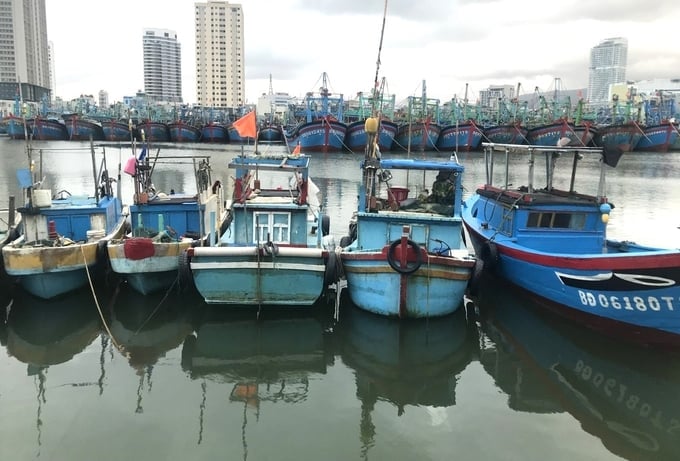
Binh Dinh province houses a large number of small-capacity fishing vessels specializing in coastal fishing. Photo: V.D.T.
According to Mr. Pham Anh Tuan, Chairman of the Binh Dinh Provincial People's Committee, the province plans to relocate nearly 600 fishing vessels previously anchored at Quy Nhon Fishing Port in Quy Nhon city to De Gi Fishing Port in Phu Cat district. Furthermore, the province will salvage approximately 340 dilapidated and inefficient fishing vessels, vessels engaged in destructive fishing practices and vessels at high risk of IUU violations.
"We estimate the cost of relocating 600 fishing vessels from Quy Nhon Fishing Port to De Gi Fishing Port and salvaging 340 dilapidated fishing vessels to be at approximately 300 billion Vietnamese dong. The province will purchase the hulls and engines of salvaged vessels in their current condition, as well as provide local fishermen with financial support for vocational training during the transition," shared Mr. Pham Anh Tuan.
According to Mr. Tuan, fishing vessels planned for salvage include ineffcient vessels with deteriorating wooden hulls, vessels at high risk of IUU violations, and vessels engaged in destructive fishing practices. Consequently, the province aims to restore the marine environment in Quy Nhon, prevent fishing practices that are disruptive to the protection of fisheries resources, and enforce anti-IUU fishing regulations within the province's waters.
On April 10, Binh Dinh province issued a plan aimed at converting several fishing practices that pose a significant impact on natural resources and the ecological environment in the years between 2024 and 2030. Subsequently, the province's Department of Agriculture and Rural Development was tasked with implementing the plan in coordination with relevant agencies and governments of coastal regions.
According to the plan, Binh Dinh will convert fishing practices that pose a significant impact on natural resources, the environment, and ecosystems to practices with minimal adverse impact, or alternative non-fishery occupations. Additionally, the province will maintain stable employment and livelihoods for local fishermen undergoing occupational transition, thereby addressing the European Commission's IUU "yellow card" warning.
Accordingly, Binh Dinh Provincial People's Committee aims to convert 342 fishing vessels operating in coastal and inshore areas. These vessels are currently engaged in destructive fisheries practices, such as trawling, trap fishing, and fishing with lighting equipment.
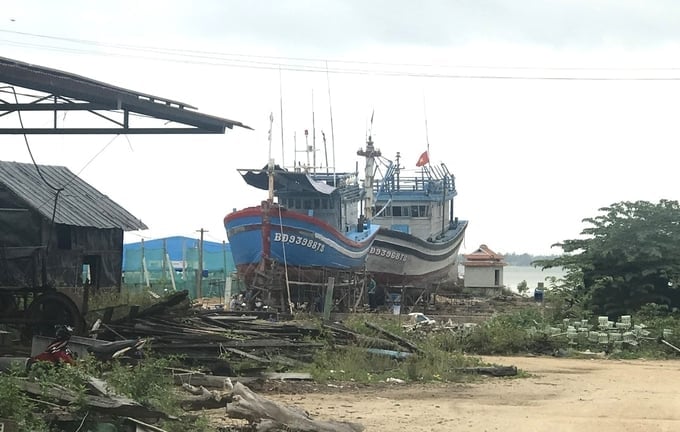
Binh Dinh province will salvage over 340 dilapidated and inefficient wooden fishing vessels, and vessels at high risk of IUU fishing violations. Photo: V.D.T.
"Binh Dinh province plans to convert 218 fishing vessels currently engaged in the aforementioned practices within coastal and inshore areas, to practices with minimal adverse impact. Additionally, 124 vessels will be redirected to alternative non-fishery occupations. Moving forward, from 2026 to 2030, Binh Dinh will continue the transition process for 198 vessels currently engaged in trawling and squid fishing within coastal and inshore areas. During this period, the province will provide occupational training for 2,000 fishermen with converted fishing vessels," stated Mr. Nguyen Tuan Thanh, Deputy Chairman of the Binh Dinh Provincial People's Committee.
According to the province's Department of Agriculture and Rural Development, Binh Dinh is currently managing a fleet of 5,310 fishing vessels, which include 863 vessels in Quy Nhon city, 429 vessels in Tuy Phuoc district, 688 vessels in Phu Cat district, 991 vessels in Phu My district, and 2,339 vessels in Hoai Nhon town.
The majority of these vessels are engaged in tuna fishing, with 1,427 vessels; followed by seine fishing with 1,302 vessels. Additionally, there are 288 trawlers, 289 trap net fishing vessels, and 226 logistics support vessels. The remaining 751 vessels are engaged in various other fishing practices.
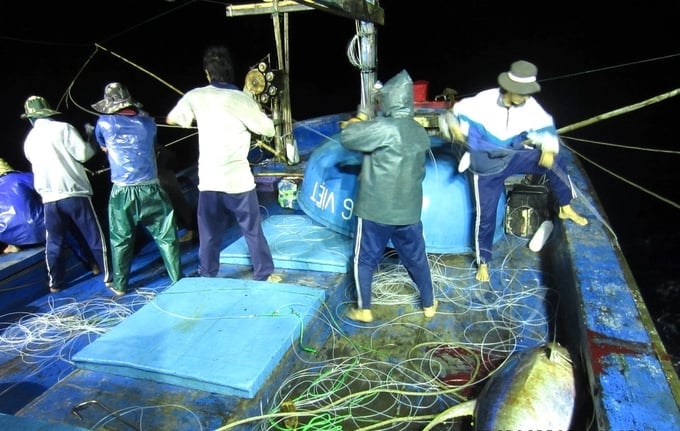
Binh Dinh province is currently managing a fleet of 1,427 vessels engaged in tuna fishing. Photo: V.D.T.
The operation of 401 trawlers in the province's coastal waters poses a significant challenge for Binh Dinh. Among this fleet, 222 trawlers specialize in highly destructive fishing practices. Moreover, an additional 404 vessels are engaged in destructive fishing practices within inshore waters, which include including squid fishing activities.
Binh Dinh province is currently managing a sizeable fleet of fishing vessels specializing in coastal and inshore operations. These vessels utilize small mesh nets, which enable the extraction of juvenile fish. This category of vessels has been targeted for reduction, with the goal of minimizing exploitation intensity. Consequently, these reduction strategies will support the sustainable development of the fisheries sector by restoring and supplementing coastal fisheries resources.
"Trawling is considered a highly destructive fishing practice that has significant impact on the environment and fisheries resources. According to regulations, trawlers must operate within offshore and inshore areas, and avoid coastal waters. However, the majority of Binh Dinh's trawlers operate in coastal waters, causing substantial damage to the seabed, its ecosystem, seagrass, and coral reefs. Moreover, the efficiency of trawling is inconsistent, with an increasing number of vessels facing financial losses," shared Mr. Tran Van Phuc, General Director of the Binh Dinh province's Department of Agriculture and Rural Development.
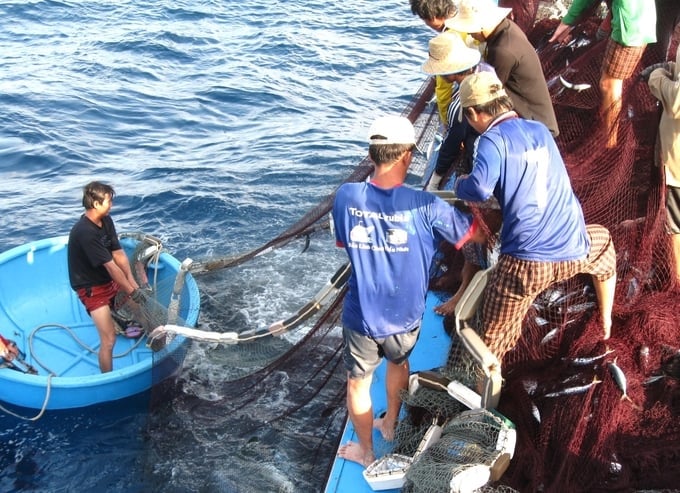
Binh Dinh province will convert fishing vessels engaged in destructive fishing practices to less impactful occupations. Photo: V.D.T.
According to Mr. Nguyen Quang Hung, General Director of the Vietnam Fisheries Surveillance, the Prime Minister has officially approved the fisheries conversion project. Accordingly, the government aims to support the transition of fishery occupations that pose a significant risk to natural resources and the environment, such as trawling. Subsequently, participants of the project will transition towards environmentally friendly occupations, or aquaculture and other non-fishery occupations.
"The Prime Minister has endorsed this initiative, and the implementation funding is outlined under the amended Decree No. 67. Upon official approval, resources from both the central and local budgets will enable Binh Dinh province to purchase fishing vessels from fishermen undergoing occupational transition, as well as facilitate their occupational training," Mr. Nguyen Quang Hung remarked.
Binh Dinh's local governments will focus on promoting and providing training for recreational fishing models; converting local trawling, cage fishing, and machine fishing models to more sustainable models. Furthermore, the province will strengthen information dissemination programs to foster positive changes in fishermen's actions towards occupational transition.
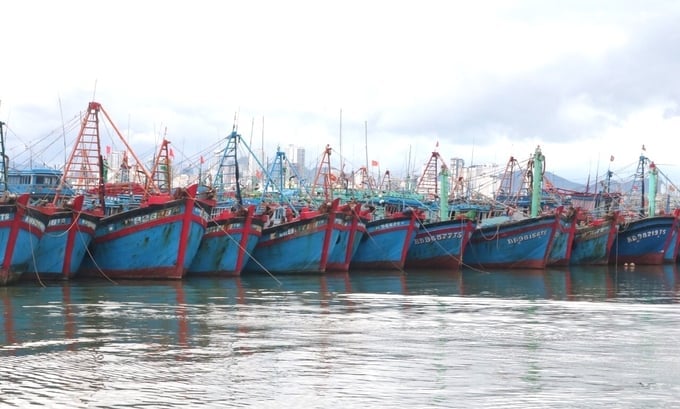
Binh Dinh province is making an active effort to annually reduce the number of fishing vessels by at least 1.5% for offshore fishing vessels, 4% for inshore fishing vessels, and 5% for coastal fishing vessels. Photo: V.D.T.
Binh Dinh province is making an active effort to annually reduce the number of fishing vessels by at least 1.5% for offshore fishing vessels, 4% for inshore fishing vessels, and 5% for coastal fishing vessels. The roadmap for reducing the number of fishing vessels will commence in 2024.
On the other hand, the province will prevent the introduction of new fishery occupations that pose a significant impact on natural resources. This initiative complies with the fisheries development guidelines set by both the Ministry of Agriculture and Rural Development and its own provincial policies. Moreover, there will be a temporary suspension of permits for acquiring vessels from other regions for the purpose of trawling, seine fishing, tuna fishing; or vessels with a lifespan exceeding ten years.
"The Provincial People's Committee has tasked relevant departments and agencies with developing and issuing support policies for fishermen undergoing occupational transition. These efforts include the adoption and transfer of new technologies for production, as well as the development and dissemination of occupational transition models. Priority is given to models that generate employment opportunities for local workers. Additionally, we must focus on selecting occupations that are feasible and suitable for the skill levels of the local fishermen," emphasized Mr. Nguyen Tuan Thanh, Deputy Permanent Chairman of the Binh Dinh Provincial People's Committee.
Translated by Nguyen Hai Long

(VAN) The draft amendment to the Circular on rice export trading stipulates a periodic reporting regime for rice exporting enterprises.

(VAN) Dong Thap farmers attained an average profit margin of 64% during the summer-autumn 2024 crop (first season), while An Giang and Kien Giang farmers followed with 56% and 54%, respectively.

(VAN) As a doctoral student doing research on renewable energy and electrification at Harvard University, the author shares his musings on electricity, nature, and countryside memories.

(VAN) The decree on Extended Producer Responsibility (EPR) ensures transparent management and disbursement of support funds, avoiding the creation of a “give-and-take” mechanism.

(VAN) Hue City rigorously enforces regulations regarding marine fishing and resource exploitation, with a particular emphasis on the monitoring of fishing vessels to prevent illegal, unreported, and unregulated (IUU) fishing.

(VAN) Hanoi People's Committee has issued a plan on reducing greenhouse gas emissions in the waste management sector with 2030 vision.

(VAN) Vietnam's draft amendment to Decree No. 156 proposes a mechanism for medicinal herb farming under forest canopies, linking economic development to population retention and the sustainable protection and development of forests.